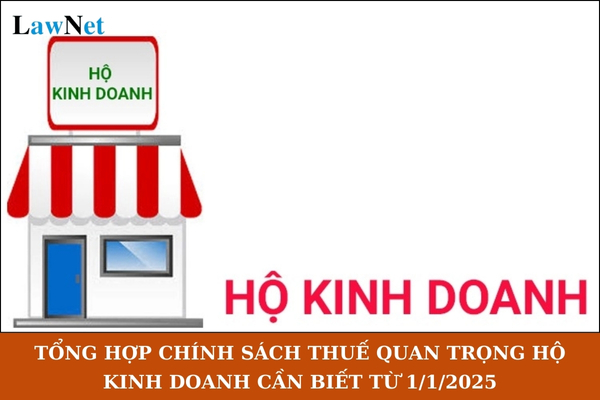What tax policies for household businesses shall come into force in Vietnam from January 1, 2025?
What tax policies for household businesses shall come into force in Vietnam from January 1, 2025?
Below is a summary of significant changes in tax policy that will come into force from January 1, 2025, which household businesses need to know:
(1) household business Owners Owing Taxes Will Be Temporarily Suspended from Exiting the Country from January 1, 2025:
Currently, Article 66 of the Law on Tax Administration 2019 stipulates as follows:
Fulfillment of Tax Obligations in the Event of Exit
- Taxpayers subject to enforcement of administrative decisions on tax management, Vietnamese citizens exiting to settle abroad, Vietnamese citizens residing abroad, and foreigners before exiting Vietnam must fulfill their tax obligations. In cases of not fulfilling tax obligations, they will be temporarily suspended from exiting in accordance with the laws on exit and entry.
...
In particular, point a, clause 1 of Article 21 of Decree 126/2020/ND-CP states that taxpayers include individuals and individuals who are legal representatives of enterprises subject to enforcement of administrative decisions on tax management who have not yet fulfilled their tax obligations.
However, clause 9 of Article 6 of Law No. 56/2024/QH15 (effective from January 1, 2025) amends and supplements clause 1 of Article 66 of the Law on Tax Administration 2019 and clearly states that the subjects suspended from exiting include both individuals and household businesses. To be specific:
Individuals engaged in business, household business owners, individuals being legal representatives of enterprises, cooperatives, and cooperative unions subject to enforcement of administrative decisions on tax management, Vietnamese citizens exiting to settle abroad, Vietnamese citizens residing abroad, and foreigners before exiting Vietnam must fulfill their tax obligations.
Thus, from January 1, 2025, household business owners will be temporarily suspended from exit if they owe taxes.
(2) E-commerce Platform Owners Must Deduct and Pay Taxes on Behalf of household businesses from January 1, 2025
Clause 5, Article 6 of Law No. 56/2024/QH15 provides as follows:
For households and individuals conducting business on e-commerce or digital platforms, the organization managing the e-commerce platform, the digital platform with payment functions (including both domestic and international organizations) and other digital economy entities as stipulated by the Government of Vietnam must deduct, pay taxes on behalf, and declare the deducted taxes for household businesses and individuals conducting business. If households and individuals conducting business on e-commerce or digital platforms are not subject to tax deduction and payment on behalf, they must directly undergo taxpayer registration, tax declaration, and tax payment.
Thus, from January 1, 2025 (the effective date of Law No. 56/2024/QH15), in cases where household businesses conduct business on e-commerce platforms, the organization managing the e-commerce platform, the digital platform with payment functions (including both domestic and international organizations), and other digital economy entities must deduct, pay taxes on behalf, and declare the deducted taxes for household businesses according to regulations by the Government of Vietnam.
(3) household businesses with Revenue Below 200 Million VND/Year Will Not Have to Pay VAT from January 1, 2026
According to Article 5 of the Value Added Tax Law 2024, which stipulates entities not subject to value-added tax, household businesses are specified as follows:
Entities Not Subject to Tax
...
- Goods and services produced and traded by households and individuals with an annual revenue of 200 million VND or less; assets of organizations and individuals not engaged in business or not liable for value-added tax sales; national reserve goods sold by national reserve agencies; fees and charges collected in accordance with the provisions of the law on fees and charges.
...
Furthermore, clause 2 of Article 18 of the Value Added Tax Law 2024 stipulates the effective date as follows:
Effective Date
- This Law shall come into effect from July 1, 2025, except as provided in clause 2 of this Article.
- Provisions on the revenue level of households and individuals engaged in production and business activities who are not subject to tax as stipulated in clause 25 of Article 5 of this Law and Article 17 of this Law shall come into effect from January 1, 2026.
- The Value Added Tax Law No. 13/2008/QH12, as amended and supplemented by Law No. 31/2013/QH13, Law No. 71/2014/QH13, and Law No. 106/2016/QH13, shall cease to be effective as from the effective date of this Law.
Accordingly, the regulation on the revenue level of household businesses will officially apply from January 1, 2026. This means that from January 1, 2026, household businesses with revenue below 200 million VND/year will not have to pay VAT.

What tax policies for household businesses shall come into force in Vietnam from January 1, 2025? (Image from the Internet)
Do household businesses have TINs?
According to point e, clause 3, Article 30 of the Law on Tax Administration 2019, the issuance of TINs is stipulated as follows:
Subjects of Taxpayer Registration and Issuance of TINs
...
- The issuance of TINs is stipulated as follows:
...
e) TINs issued to families, household businesses, individual businesses are TINs issued to individuals representing families, household businesses, and individual businesses.
...
Thus, household businesses do have TINs, and the TIN issued to a household business is the TIN issued to the individual's representative of the household business.
Vietnam: Is the TIN for a household business 10 digits or 13 digits?
According to clause 2, Article 30 of the Law on Tax Administration 2019, the structure of TINs for household businesses is regulated as follows:
Subjects of Taxpayer Registration and Issuance of TINs
...
- The structure of TINs is regulated as follows:
a) The 10-digit TIN is used for enterprises, organizations with legal person status; representatives of families, household businesses, and other individuals;
b) The 13-digit and character TIN is used for dependent units and other subjects;
c) The Minister of Finance shall prescribe in detail for this clause.
...
Thus, the structure of TINs for household businesses is a 10-digit TIN.

